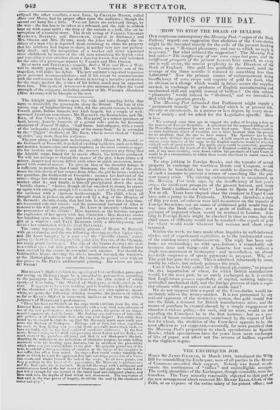TOPICS OF THE DAY.
1II01\;"170 STOP THE DRAIN OF BULLION.
OUR courteous contemporary the Morning Post, " organ of the Bank Parlour," regards our suggestion that abolition of the Corn-duties might be the intended remedy for the evils of the present banking system, as an " ill-timed pleasantry, and one to which no reply is necessary." But what induced the suggestion ? The Morning Posi had said—" The limnfliciency cf our corn emps last year, and the indiffirent prospects tf the present harvest, have caused, as every one is well aware, the utmost perplexity to the Directors of the Bank of England. Our gold has gradually decreased, until the average of the three months is reduced to something less titan 3,000,000/." NOW the primary causes of embarrassment being insufficiency of corn crops and exports of gold for food, what so obvious as a change which would in future secure the supplies needed, in exchange far products of English manufitcturing and mechanical skill and capital instead of bullion ? On this subject " pleasantry would indeed be " ill-timed," and we intended to deal with the question gravely.
The Horning Post intimated that Parliament might supply a " permanent remedy for the mischief which is at present felt, directly or circuitously, in a greater or less degree, by every mem- ber of' society ; and we asked for the Lcgislative specific. Here it is- " We ventured some time ago to suggest the policy of levying a duty out the transfer of Forei:m Securities. A substitute for the assumed thing...off in the Post-otliee department has not yet been fixed upon. Now, there could be no mom legitimate olject of taxation, nor a titter moment than the present fur its adoption, than the one we have named. The Spectator has by this time a more di,tinet idea Of oar meaning. A bold impost on Foreign Bonds, and on every transC,r of the same in the English markets, would be attended with all of good results. The public purse would be protected; gambling would be checked; the hands of the Bank if England would be strengthened; and, if any more croaking were heard within the precincts of Capel Court, it would be at a circumstance in which there would elsewhere be found cause for rejoicing."
To stop jobbing in Foreign Stocks, and the transfer of actual property in exchange for worthless Bonds and Coupons, would doubtless be beneficial; but we are unable to discern the efficacy of such a measure to prevent a return of something like the pre- sent money crisis. The existing embarrassment is occasioned, as the Morning Post truly says, by the insufficiency of last year's crops. the indiffixent prospects of the present harvest, and drain of the Bank's bullion—for what ? Loans to Spain or Portugal? Not at all. Years have elapsed since the croakers in Capel Court have sent a penny to the Peninsula. Although, therefore, a duty of fifty per cent, ad valorem were laid to-morrow on the transfer of Foreign Securities, not an ounce of additional gold would find its way into the Bank cellars ; not a grain of' bullion, needed for payment of imported wheat, would be retained in London. Job- bing in Foreign Bonds might be checked in time to come, but the chief cause of difficulty would not be touched—the export of gold for wheat would recur wherever bad seasons and short crops returned.
Within the week. we have made close inquiries in well-informed circles, and of experienced capitalists, as to the fundamental cause of the existing money umbarrassinc•nt. The reply has been uni- tbrm : no overtrading; no wild spec olations ; mu remarkably safe business done mid doing—vide a Gazette last week without a single announcement of' bankruptcy : and nevertheless, an almost inevitable suspension of specie payments in prospect. Why so? The gold has gone for corn. This is admitted, reluctantly by some, readily by others, but nobody gainsays the truth. Can it then be thirly called an "ill-timed pleasantry," to propose the free importation of wheat, for which British manuffictures would, for the most part, be as surely exchanged as it is certain that Englishmen possess superfluity- of capital, untiring industry, unrivalled mechanical skill, and the foreign growers of corn a supe- rior climate with a greater extent of arable land ?
We do not suppose that a repeal of the Corn-duties would im- mediately relieve the money-market. It is not pretended by any rational opponent of the restrictive system, that gold would flow into the Bank, a demand for British manufactures arise, and the means of purchase he created abroad, by a simple engagement to abandon a vicious policy,—for such, and no more, would an act repealing the Corn-laws be in the first instance : but as a pre- ventive of future embarrassment, occasioned by the export of bul- lion for wheat, the abolition of the Corn-laws appears to be the most efficient as yet suggested,—assuredly far inure practical than the Morning Po.st's proposition to check speculations in Spanish Bonds ; which speculations have for years been mere exchanges of bits of paper, and affect not the returns of bullion exported in the slightest degree.


























 Previous page
Previous page